Last update:
Vaccination news
Immunology
Researchers develop a new vaccine additive that creates a stronger, tunable immune response
Researchers at Stanford Engineering have developed a nanoparticle platform that could make existing vaccines more effective, including those for influenza, COVID-19, and HIV. In addition to helping vaccine candidates produce ...
12 hours ago
0
86
Diseases, Conditions, Syndromes
Researchers create new treatment and vaccine for flu and various coronaviruses
A team of researchers, led by the University of Houston, has discovered two new ways of preventing and treating respiratory viruses. In back-to-back papers in Nature Communications, the team—from the lab of Navin Varadarajan, ...
Aug 6, 2024
0
60
Very slow malaria pathogens could be suitable as a vaccine
Scientists have successfully tested a new approach for a malaria vaccine in animal experiments. They used genetically modified malaria parasites that developed normally in the mosquito but at a significantly slower rate in ...
Aug 6, 2024
0
0

New study reveals how fear and vaccine hesitancy could fuel conspiracy beliefs
New research has shown that fear around vaccination can increase vaccine hesitancy, where conspiracy beliefs may then be used to justify not vaccinating, with these findings likely helping to inform more effective public ...
Aug 6, 2024
0
4

Florida's RSV season has started, and it's coming soon to the rest of US
Many people have gotten used to rolling up their sleeves for flu and COVID-19 vaccines.
Aug 5, 2024
0
1

Strengthening global regulatory capacity for equitable access to vaccines in public health emergencies
Three high-impact steps could be taken by global health leaders to reshape the global regulatory framework and help address the pressing need for equitable access to diagnostics, therapeutics, and vaccines during public health ...
Aug 3, 2024
0
53

Researchers make breakthrough in bid to develop vaccines and drugs for neglected tropical disease
Scientists have developed a new, safe and effective way to infect volunteers with the parasite that causes leishmaniasis and measure the body's immune response, bringing a vaccine for the neglected tropical disease a step ...
Aug 2, 2024
0
23
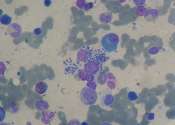
Comprehensive meta-analysis pinpoints which vaccination strategies different countries should adopt
Vaccines are safe and effective, and help reduce death and illness. But global vaccination rates are suboptimal and have trended downward, leaving humanity more vulnerable to vaccine-preventable diseases such as COVID-19, ...
Aug 1, 2024
0
33

COVID-19 vaccination may increase risk for urinary tract symptoms
COVID-19 vaccination seems to have some side effects on the lower urinary tract and overactive bladder in younger adults, according to a study published online June 24 in Frontiers in Medicine.
Aug 1, 2024
0
36

Incidence of heart attacks and strokes was lower after COVID-19 vaccination, finds study of 46 million adults
A new study, published today in Nature Communications and involving nearly the whole adult population of England, has found that the incidence of heart attacks and strokes was lower after COVID-19 vaccination than before ...
Jul 31, 2024
0
249

Study indicates vaccines targeting nose, mouth may be key to controlling spread of COVID-19
The lightning-fast development of COVID-19 vaccines just months after the virus appeared was a triumph of modern science and saved millions of lives. But for all the good they did in reducing illnesses and deaths, the shots ...
Jul 31, 2024
0
67

Long COVID ties with heart disease for health outcomes: Vaccines reduce risk, study finds
Long COVID is on par with heart disease in terms of its severity, but vaccination reduces risks of long COVID by nearly 70%, say researchers at Washington University.
Jul 31, 2024
0
1

Route to more effective malaria vaccines revealed through human-challenge trials
Infecting volunteers with malaria reveals why some get sick and others don't—and points to ways to induce stronger immunity through vaccination.
Jul 30, 2024
0
19
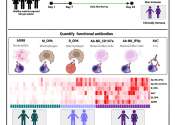
US will buy flu shots for farmworkers in a bid to prevent bird flu from getting worse
The U.S. will pay for flu shots for farmworkers this year, a strategy to prevent bird flu from changing into something more dangerous.
Jul 30, 2024
0
1
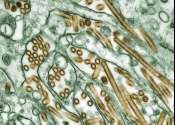
New push for mRNA bird flu vaccine development: WHO
The World Health Organization announced Monday a new project to accelerate the development in poorer countries of vaccines for human bird flu infections using cutting-edge messenger RNA technology.
Jul 29, 2024
2
32

COVID-19 on the upswing in Chicago again this summer
If it seems like you suddenly know a lot of people with COVID-19 this summer, it's not just you.
Jul 29, 2024
0
0

US measles cases are already triple those of last year
With five months still to go, the number of U.S. measles cases reported so far this year has already triple that of all the cases seen in the country last year, federal health officials report.
Jul 29, 2024
0
0

How to start the school year strong and prevent illness in children
The excitement of a new school year unfolds each year when families flood the superstore aisles to buy classroom supplies, tape after-school schedules on the fridge and organize carpools with friends.
Jul 29, 2024
0
0

The summer COVID-19 surge is here: How to stay safe
The numbers at the Northeast Georgia Health System don't lie. The COVID-19 summer surge is here.
Jul 29, 2024
0
0

Vaccines tell a success story that Robert F. Kennedy Jr. and Trump forget—here are some key reminders
Vaccinations have provided significant protection for the public against infectious diseases. However, there was a modest decrease in support in 2023 nationwide for vaccine requirements for children to attend public schools.
Jul 26, 2024
0
0

New shingles vaccine could reduce risk of dementia
A study of more than 200,000 people by researchers at the University of Oxford found at least a 17% reduction in dementia diagnoses in the six years after the new recombinant shingles vaccination, equating to 164 or more ...
Jul 25, 2024
0
116

Self-amplifying mRNA vaccines appear safe in lab and animal tests
mRNA vaccines contain instruction codes for making parts of pathogenic viruses. Can so-called self-amplifying types of such vaccines form unwanted and dangerous connections with other viruses? Yes, say Wageningen virologists ...
Jul 25, 2024
0
49
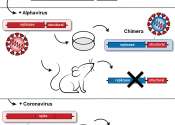
COVID is surging again this summer in Maryland, hospitalization and wastewater data shows
Judging from local wastewater surveillance trends, President Joe Biden has plenty of company in Maryland as he continues to recover this week from his third bout of COVID-19.
Jul 25, 2024
0
0
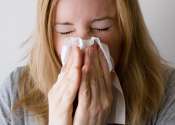
What's the difference between 'strep throat' and a sore throat? A vaccine is being developed for one of them
It's the time of the year for coughs, colds and sore throats. So you might have heard people talk about having a "strep throat."
Jul 24, 2024
0
1
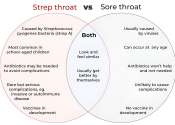
FLiRTy summer: All you need to know about the latest COVID variants
As yet another batch of variants fuel a COVID surge this summer, one expert offers advice on how to navigate the threat.
Jul 22, 2024
0
2




















